General
DVCFA Appeals For Collaboration and Advocacy When Addressing Health Challenges
Published
8 years agoon
Makerere University School of Public Health and College of Veterinary Medicine, Animal Resources and Biosecurity (CoVAB) on 12th April, 2018, at Protea Hotel, validated a report on the weaknesses and gaps identified in the inter-sectoral teams from the Government that respond to emerging pandemic zoonoses, such as the recent Marburg Viral Fever outbreak in Kween and Kapchorwa Districts in November 2017. This study was supported by supported by funds from One Health Central and Eastern Africa (OHCEA) and the USAID One Health Workforce (OHW) Project.
Responding to zoonotic disease solely within a single discipline or sector, limits the understanding of the disease situation, results in poor decision making, inefficient coordination and unsatisfactory response to the outbreak. Inter-sectoral collaboration, (also known as the one health approach), is most desirable, and is now operational under the framework of the National One Health Platform in government sectors that primarily respond to infectious diseases. These are the Ministry of Health (MoH), Ministry of Agriculture Animal Industry and Fisheries (MAAIF), Ministry of Water and Environment (MWE) and Uganda Wildlife Authority (UWA). This collaborative approach will enable Uganda meet the goals as required by the Global Health Security Agenda (GHSA).
The workshop was opened by the Director of Environmental Affairs from the Ministry of Water and Environment who is the current chair of the National One Health Platform and he advocated for the institutionalization of the One Health Approach, which will result in join envisioning and planning at the ministerial level. Prof. William Bazeyo who is the Deputy Vice Chancellor in charge of Finance and Administration (DVCFA), Makerere University, as well as the Principal Investigator (PI) and CEO OHCEA, urged professionals from various government sectors as well as academia present collaborate with each other and take the message and concept of One Health to the grassroots where the health challenges stem from. Examples of innovative and easily available forum to be used included social media. The Principal, CoVAB who is also the Co-PI OHCEA, Prof. John David Kabasa, in his keynote address stressed that solutions to health issues are dynamic and need to cut across disciplines and educational levels.“People should be molded in One Health right from childhood to higher levels of education,”
The workshop participants included a representative of the Director of Animal Resources, MAAIF, Commissioners from Ministry of MoH, MAAIF and MWE, Senior Health, Veterinary and Environment Government Officers, Consultants in Wildlife, representatives from National Curriculum Development Center, Deans and Departmental Chairs in Makerere Academia, representatives from CDC-Uganda, FAO-ECTAD-Uganda, USAID Preparedness and Response Project, PREDICT-2 and the USAID Uganda Mission. There was an informative plenary discussionconfirming the gaps, weaknesses on the One Health workforce with action points suggested to improve the functioning of the inter-sectoral one health workforce in mitigating infectious health challenges. These findings will be used by the university and other partners (government inclusive) in planning and designing interventions for joint workforce development or enriching one health action plans.
The Assistant Commissioner Information and Communication, (MAAIF), Ms. Connie Acayo, concluded the workshop by reiterating the need for the application of the four “C’s” within the one health (inter-sectoral) approach-Co-operation, Co-ordination, Capacity and Containment of the emerging pandemic threats.
The validated report entitled the “Analysis of the One Health Workforce” was synthesised in close collaboration with government by reviewing several country assessments including Joint External Evaluation (JEE, June 2017) and National Action Plans. A multi-sectoral consultative meeting (22nd to 24th August 2017) utilized the OH-SMARTTM toolkit to strengthen the synthesis report from document review.
Some of the significant capacity and competency gaps revealed by our assessment of the one health workforce as they detect, prevent and respond prioritized zoonoses included: the need for workforce capacity building in management, leadership, communication strategies, risk communication, negotiation, conflict resolution, systems thinking, information technology and informatics. Other gaps pointed towards the need for capacity in disease surveillance, laboratory systems, increasing awareness for the need of one health in academic institutions and a policy framework for the operationalization of the one health approach.
Article by Dr. Peninah Nsamba, CoVAB Focal Person OHCEA
You may like
General
From Knowledge to Impact: Empowering Youth Leaders and Young Women with Transformative Leadership Skills
Published
6 hours agoon
December 15, 2025By
Mak Editor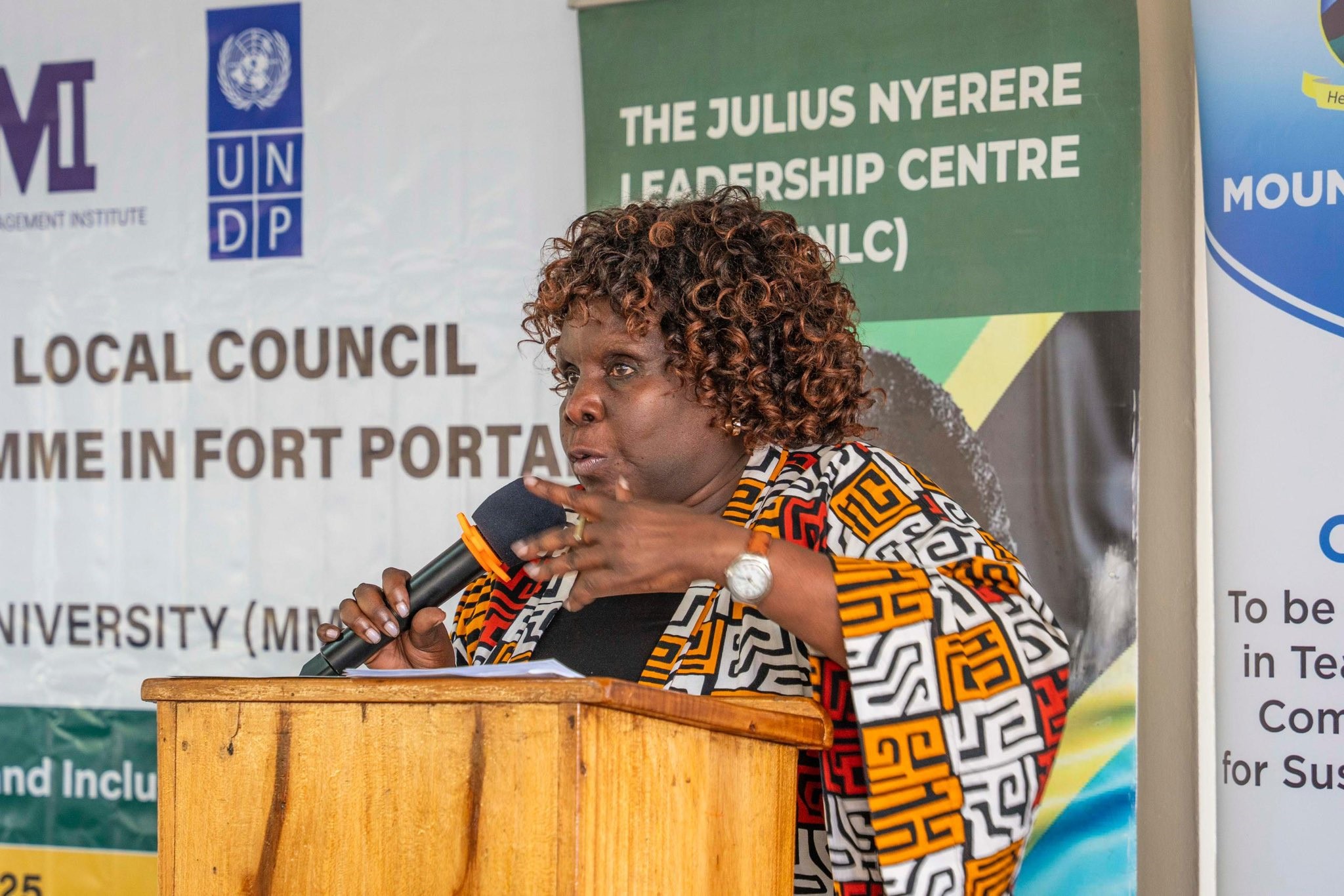
By JNLC Team
On 4th December 2025, more than 70 participants gathered at Mountains of the Moon University (MMU) in Fort Portal for a three-day comprehensive leadership training targeting youth, young women, and local council leaders.
Organised by the Julius Nyerere Leadership Centre (JNLC) in partnership with the United Nations Development Programme (UNDP), the training aimed to strengthen practical leadership skills and nurture a new generation of community-centered, ethical, and solution-oriented leaders.
The first day introduced participants to foundational themes such as servant leadership, the meaning of power in leadership, self-leadership, emotional intelligence, mental well-being, and effective communication. Through these sessions, participants gained practical tools to engage and influence communities responsibly, mobilize resources, and contribute effectively to sustainable development.
Honouring Nyerere’s Legacy of Transformative Leadership
In her remarks, Dr. Nansozi K. Muwanga, Executive Director of JNLC, urged young leaders from higher education institutions across Uganda to embrace their central role in shaping the country’s future. She stressed that Uganda’s developmental trajectory—and that of the wider East African region—will be determined by empowered, ethical, and visionary youth.
Dr. Muwanga reminded participants that the Julius Nyerere Leadership Centre draws inspiration from the leadership values of Mwalimu Julius Kambarage Nyerere, who championed youth as drivers of Africa’s development. Established in 2018 by H.E. President Yoweri Kaguta Museveni as a Presidential Initiative hosted by Makerere University and the Uganda Management Institute, JNLC continues this legacy by equipping young Africans with the intellectual, moral, and practical leadership skills required in a fast-changing world.
Expanding Impact Through the JNLC–UNDP Youth Leadership Programme
Dr. Muwanga highlighted that since 2021, the JNLC–UNDP Leadership Training Programme has empowered more than 700 youth leaders from Uganda and beyond. The programme cultivates a growing network of community-centered changemakers capable of influencing governance and driving sustainable development.
To address challenges faced by alumni—such as limited visibility, resource constraints, and weak mentorship—JNLC launched the Alumni Impact Activation Strategy. The initiative supports alumni-led projects aligned with UNDP’s G4D priorities through mentorship, empowerment, and visibility. This approach amplifies our investment in Uganda’s youth and ensures that leadership development translates into sustainable solutions in climate resilience, women’s economic empowerment, and digital innovation,” she noted.
Youth at the Heart of Africa’s Development
Reflecting on Africa’s demographic landscape, Dr. Muwanga noted that a youthful population presents both immense opportunity and profound responsibility. Realising this potential requires intentional nurturing of leaders who value justice, unity, ethical conduct, and collaborative governance.
“This is the aspiration that guides our work at JNLC,” she affirmed. “We aim to equip young people with the skills to think critically, lead responsibly, and contribute meaningfully to Uganda’s development and Africa’s broader ambitions.”
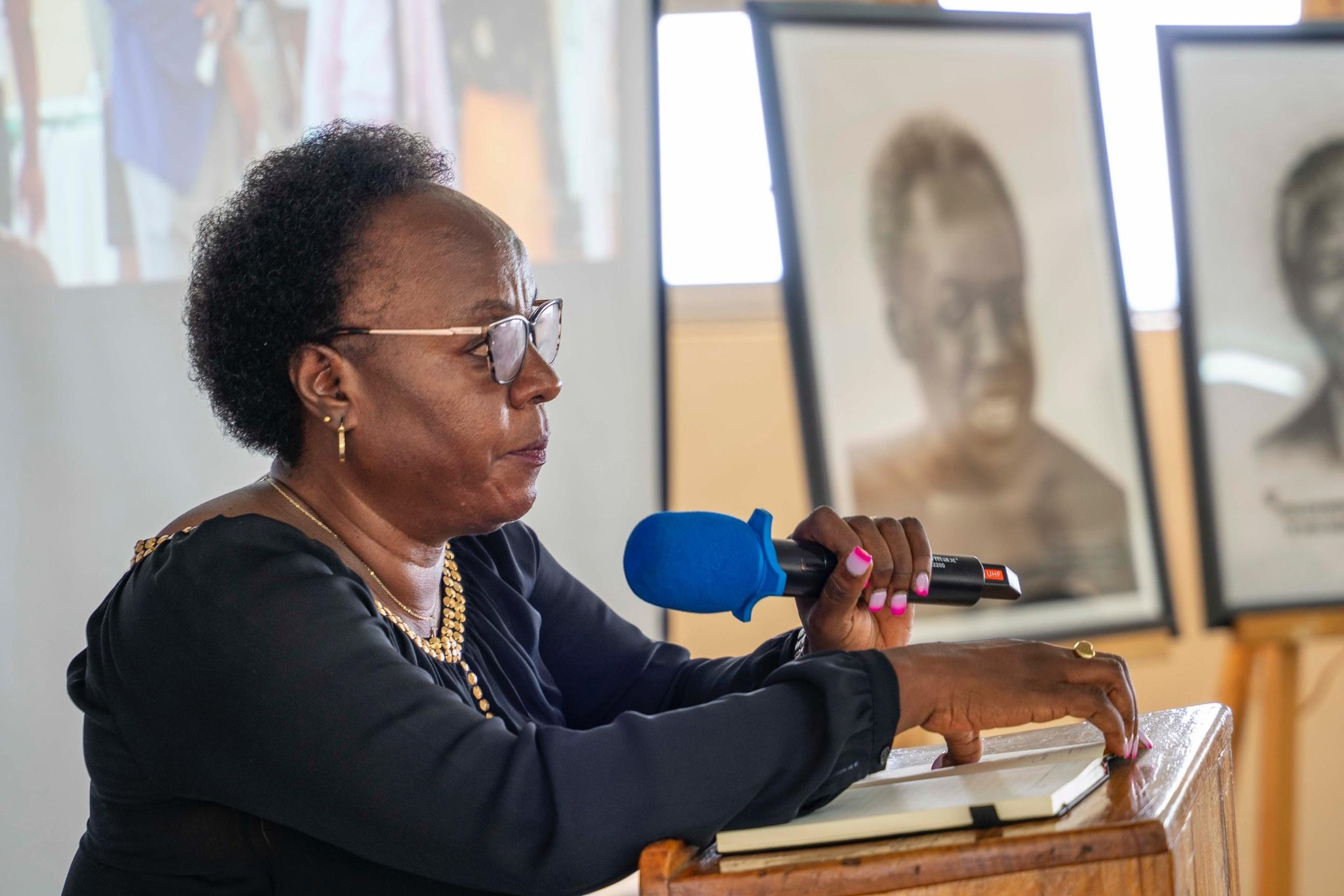
“You Are Today’s Leaders” — Message from Mountains of the Moon University
Representing the Vice Chancellor, Prof. Pius Coxwell Achanga, Mrs. Roselyne Ssali—the Dean of Students—affirmed the university’s strong commitment to cultivating ethical, capable, and community-oriented leaders.
She emphasized the value of inter-institutional collaboration, noting that leadership thrives on shared learning and collective growth. She encouraged participants to engage actively, exchange ideas, and learn from one another.
Addressing the youth directly, Mrs. Ssali underscored that leadership is not a distant possibility but a present responsibility.
“You are not here by mistake,” she said. “The saying that you are ‘tomorrow’s leaders’ does not apply. You are today’s leaders, and that is something we cannot take for granted.”
She commended the JNLC–UNDP collaboration for expanding leadership opportunities and equipping young people with practical, real-world skills.
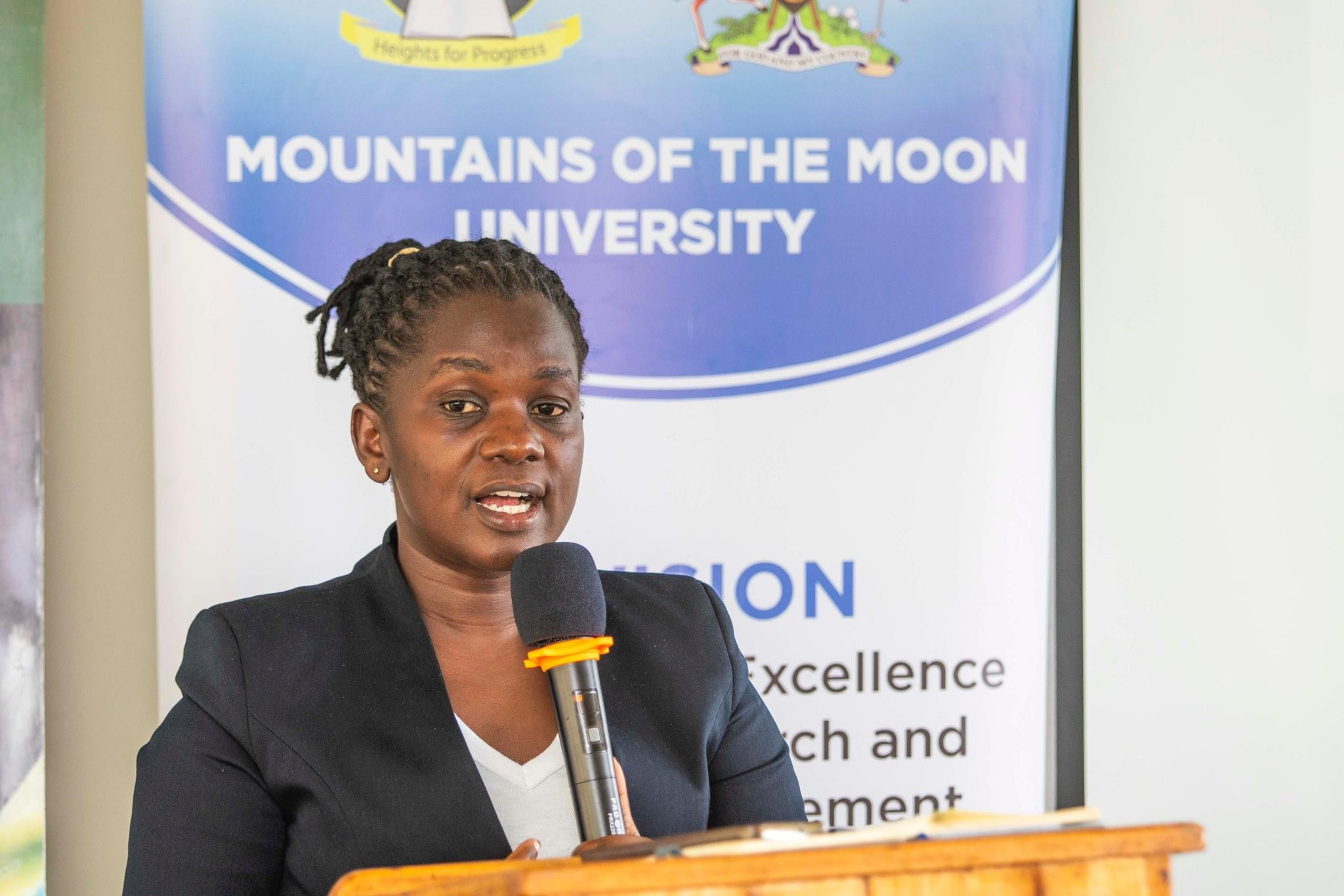
Leadership, Intellect, Capacity, Health, and Safety — Insights from the RCC
Officially opening the training, Ms. Asuman Nasike, Resident City Commissioner of Fort Portal City, shared her inspiring journey from Youth Councillor to RCC. She encouraged participants to treat every leadership role as a “nursery bed” for growth and reminded them that leadership is driven by intellect and capacity—not age or physical size.
“In your roles as local, youth, and women leaders, remember that leadership is defined by capacity, not size. It is about the mind, not the stature. I may be small in size, yet I lead this city. Let my example prove to you that young people can lead and make a difference,” she said.

She highlighted essential leadership qualities: integrity to earn trust, effective communication through feedback, leading by example, decisiveness in difficult moments, and resilience in the face of setbacks. She also emphasized personal well-being, responsible health practices, and surrounding oneself with mentors and peers who inspire growth.

Learning from Nyerere’s Leadership Ideals
Drawing from the life and leadership of Mwalimu Julius Nyerere, Mr. Ivan Ssegawa Sebastian, former EAC Youth Ambassador to Uganda, outlined enduring values that shaped Nyerere’s leadership: human dignity, collective responsibility, unity and cultural identity, and service above self.
These ideals, he noted, remain essential foundations for ethical and people-centered leadership today.

Principles of Servant Leadership
Leadership trainer and clinical psychologist Mr. Ronald Ssaazi guided participants through the principles of servant leadership, drawing insights from leaders like Nyerere, Nelson Mandela, Martin Luther King Jr., and Gamal Abdel Nasser.
He emphasized that leadership begins with self-leadership—self-reflection, self-regulation, and deliberate goal-setting. Quoting John Maxwell’s famous line, “Leadership is influence—nothing more, nothing less,” he reminded participants that they must influence themselves before they can influence others. “You cannot claim to be a leader if no one wants to follow you. Leadership begins when you influence people through your direction, ideas, and example—and that influence must start with self-leadership,” he stressed.
Mr. Ssaazi highlighted that servant leadership is rooted in service—lifting others, meeting them where they are, and helping them grow. He underscored the importance of character, emotional intelligence, meaningful relationships, and consistent action.
He also shared the “Three R’s” framework—Requirements, Returns, and Rewards—encouraging participants to focus on high-impact actions and remain motivated as they pursue purposeful leadership.
Emotional Intelligence & Mental Wellness for Effective Leadership
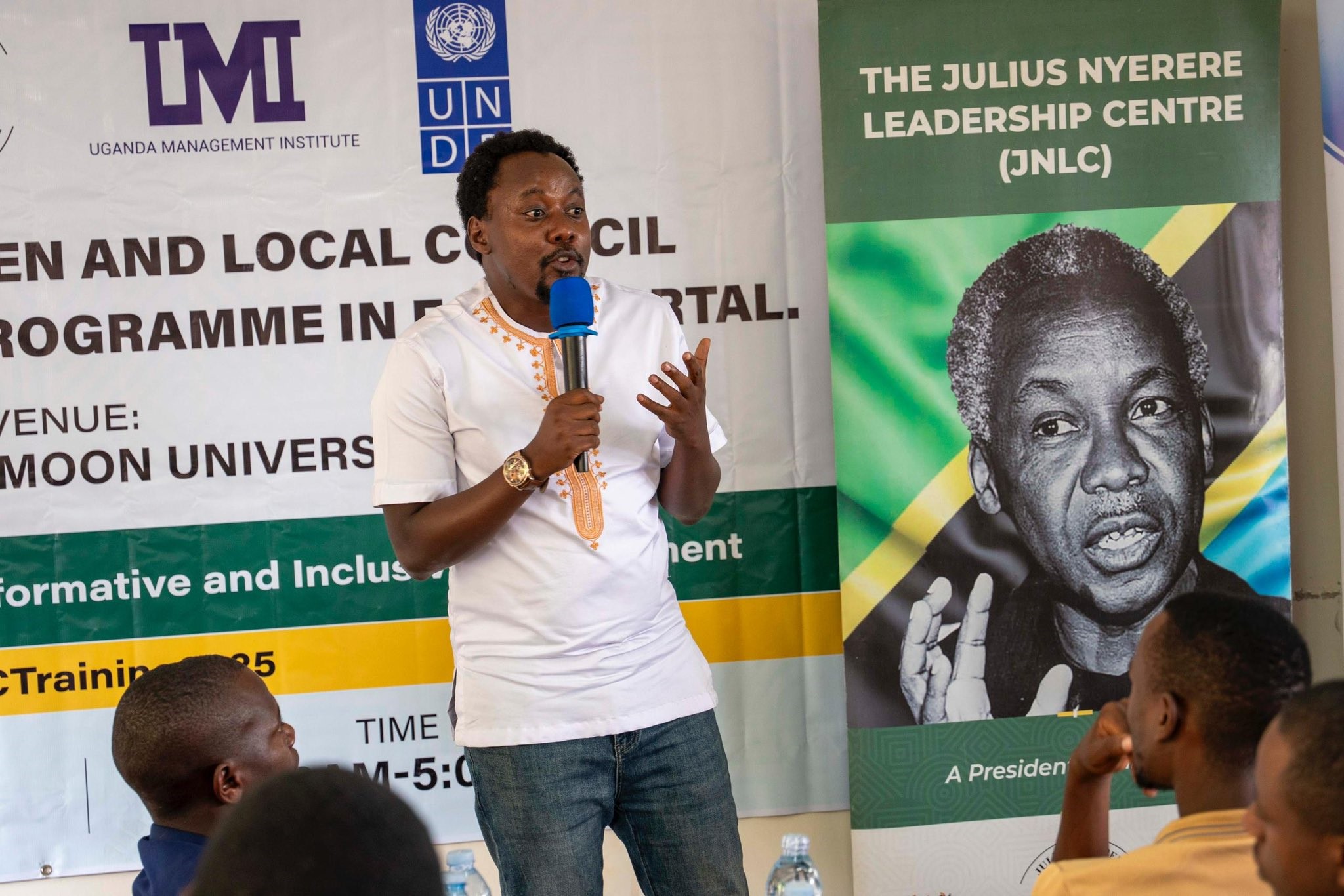
Dr. Gardner Herbert Rwakiseta, Programme Coordinator at JNLC, underscored that effective leadership is impossible without mental and emotional balance. He explained that clarity, creativity, and inner peace form the foundation of impactful leadership.
Using a powerful analogy, he noted:
“A smartphone may look perfect on the outside, but without a functioning battery, it cannot operate.” He likened mental health to a leader’s battery—indispensable to performance. Dr. Gardner explained that mental wellness is more than the absence of illness; it determines how leaders think, relate, and make decisions. He outlined common mental health challenges and their symptoms and provided practical tools for maintaining emotional balance, including exercise, sleep hygiene, healthy relationships, journaling, and setting digital boundaries.
On digital discipline he advised:
“The small screens were not designed to control you. Manage distractions by limiting unnecessary notifications and practicing intentional use of technology.”
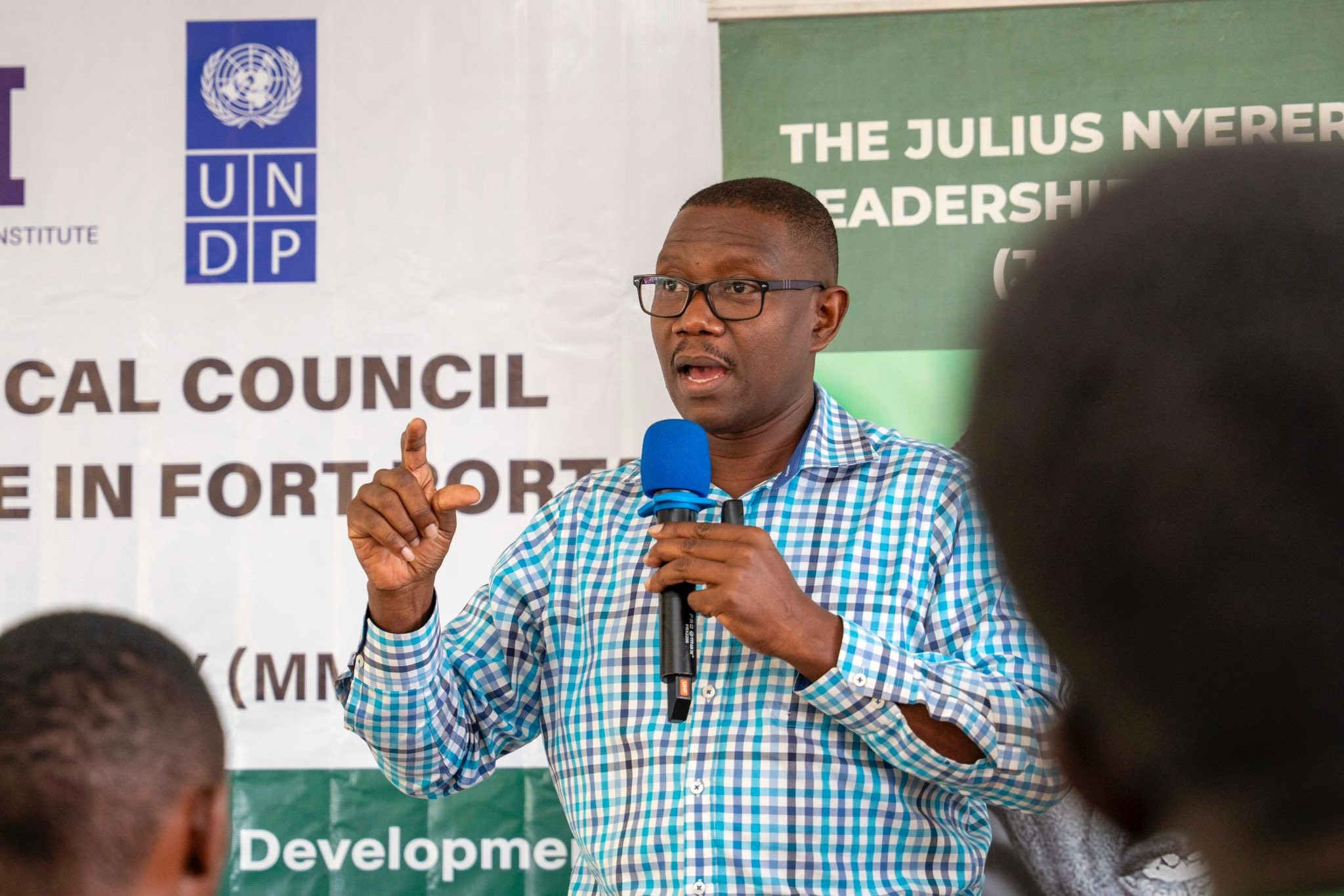
The Power of Effective Communication
Mr. Henry Kasacca, Director of Dialogue and Democracy, emphasized that communication is at the heart of leadership. His session equipped participants with public-speaking skills, active listening, strategies for giving and receiving feedback, and tips for crafting impactful elevator pitches.
He reminded participants that public speaking is not merely addressing a crowd—it is connecting with people, informing them, and motivating them to act. “Preparation, positive non-verbal communication, and confidence are key. Knowing your audience, understanding the purpose of your speech, and structuring your message ensure that it resonates,” he explained.
He noted that leaders often have only a minute to capture attention, stressing the importance of clarity, relatability, and confidence. He also emphasized constructive feedback as an essential tool for growth.
The Meaning of Power in Leadership
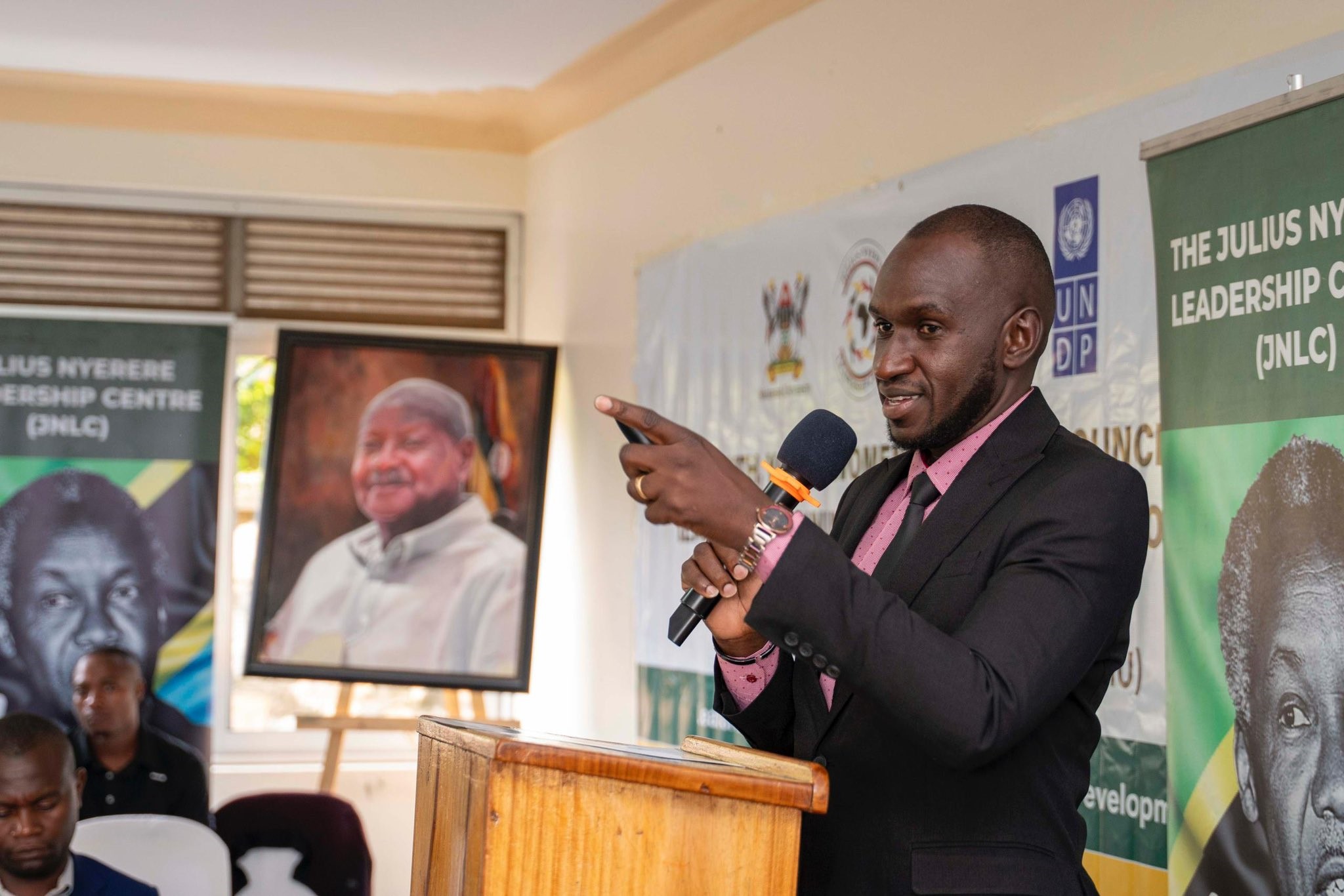
Mr. David Nyaribi, Leadership and Governance Specialist at ActionAid International, emphasized that leadership is not defined by position but by the ability to influence, mobilize, and transform communities.
He distinguished authority from power, noting that while authority is granted, power—knowledge, confidence, action—is accessible to everyone.
He outlined four essential types of power:
- Power Over – traditional authority
- Power To – capacity to act and implement
- Power Within – inner confidence and resilience
- Power With – collective strength through collaboration
Mr. Nyaribi urged participants to use power responsibly and be mindful of who they grant influence over them. He also explained the different spaces, levels, and sources of power, from households to global diplomacy, and highlighted the difference between mobilizing (short-term energy) and organizing (long-term structure). “Mobilizing gets people to the table; organizing makes the table productive,” he noted.
Youth Voices: Picking Up the Droplets of Leadership
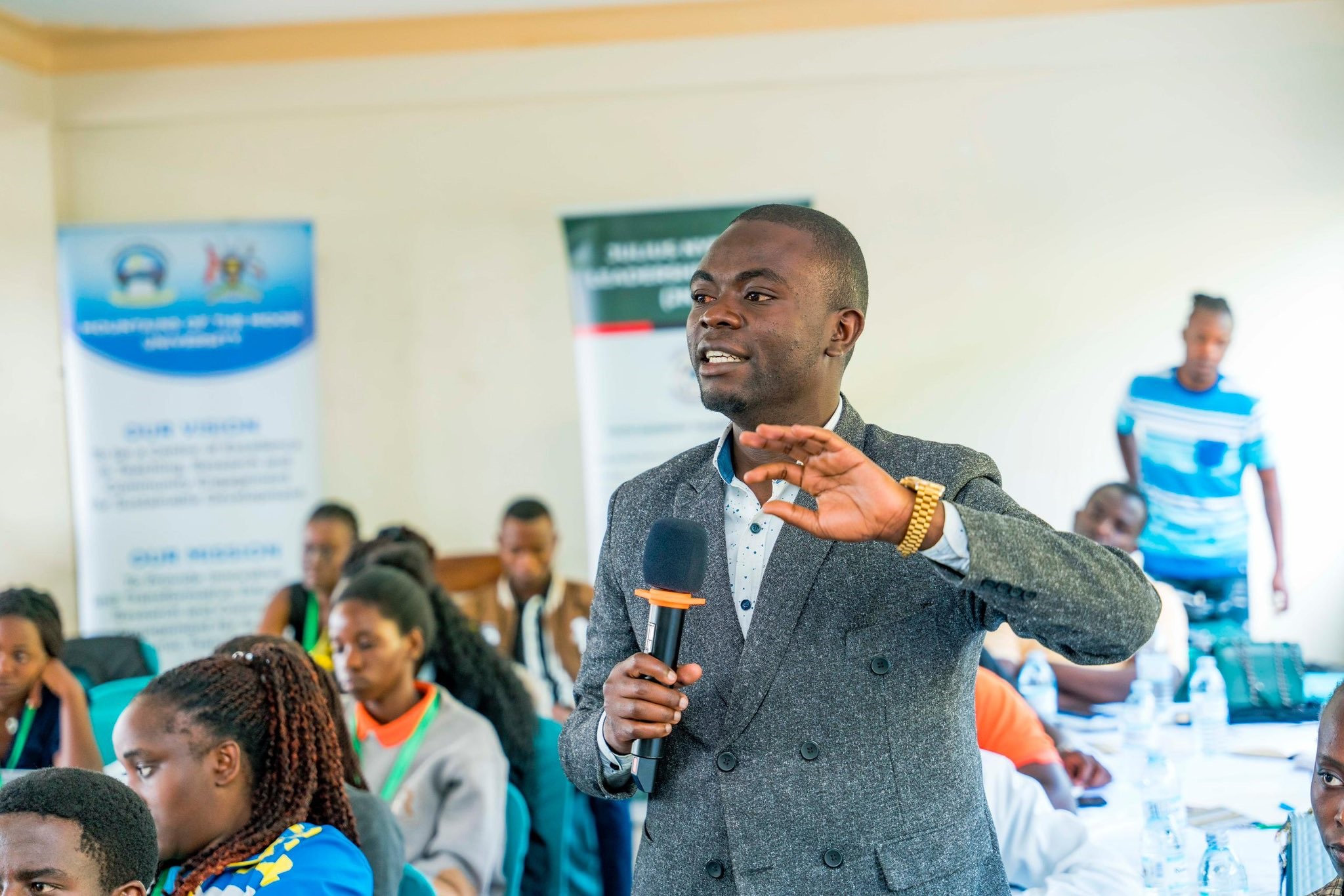
Bringing a youth perspective, Mr. Ivan Hurira, Speaker of the Regional Youth Parliament, shared the story of a brave hummingbird dropping water on a burning forest, insisting, “I am doing the little I can.” He likened this to the role of young Ugandans—small but consistent actions can spark meaningful change.
“When the forest of Uganda is burning, we, the young people, can do the little we can,” he said.
He encouraged participants to treat the knowledge and skills gained during the training as droplets of leadership—resources they should carry back to their communities to contribute to transformation.
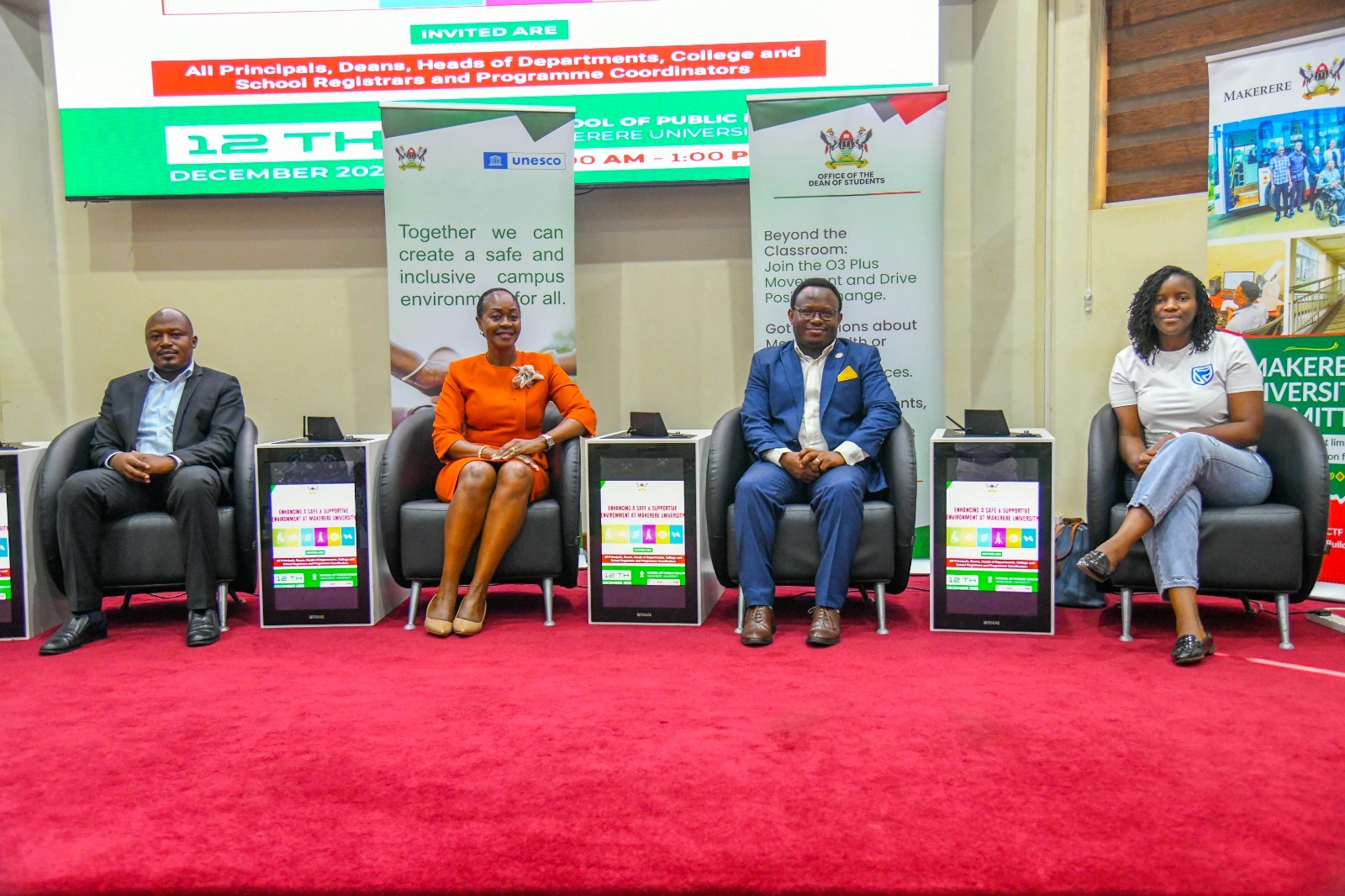
In a move to promote a safe, supportive and inclusive environment at Makerere University, the Office of the Dean of Students has empowered staff members from various colleges, departments and administrative units to champion disability-inclusive education.
Speaking during the capacity building session on inclusion for Students and Staff with Disabilities held at the School of Public Health Auditorium on Friday December 12, 2025, Dr Winfred Kabumbuli, the Dean of Students, noted that her office has decided to train staff to be able to have a campus where every student and staff member feels safe, respected, valued and empowered to thrive.
“Inclusion is not achieved by policy documents alone, it is achieved through everyday actions when a lecturer adapts teaching materials, when departments provide accessible formats, when buildings are designed with universal access in mind and when we intentionally create belonging for students and staff with disabilities,” Dr Kabumbuli, said.

The University has made significant strides in promoting disability inclusion. There is a policy on Persons with Disabilities and also a Disability support center, enabling students with disabilities to acquire assistive devices to enable them integrate in the learning and social environment.
While addressing participants, Prof. Winston Tumps Ireeta, the Acting Deputy Vice Chancellor (Finance and Administration) who represented the Vice Chancellor Prof. Barnabas Nawangwe, urged all university leaders to ensure that lecture rooms, offices and shared spaces fully reflect the principles of accessibility and universal design.
“My office is committed to improving physical access and ensuring that our infrastructure developments embrace inclusive standards. During the session, let us identify gaps, share insights, and commit to concrete actions. Makerere University’s pursuit of excellence rests on the foundation of safety, dignity, equality, and inclusion,” Prof, Ireeta, said.
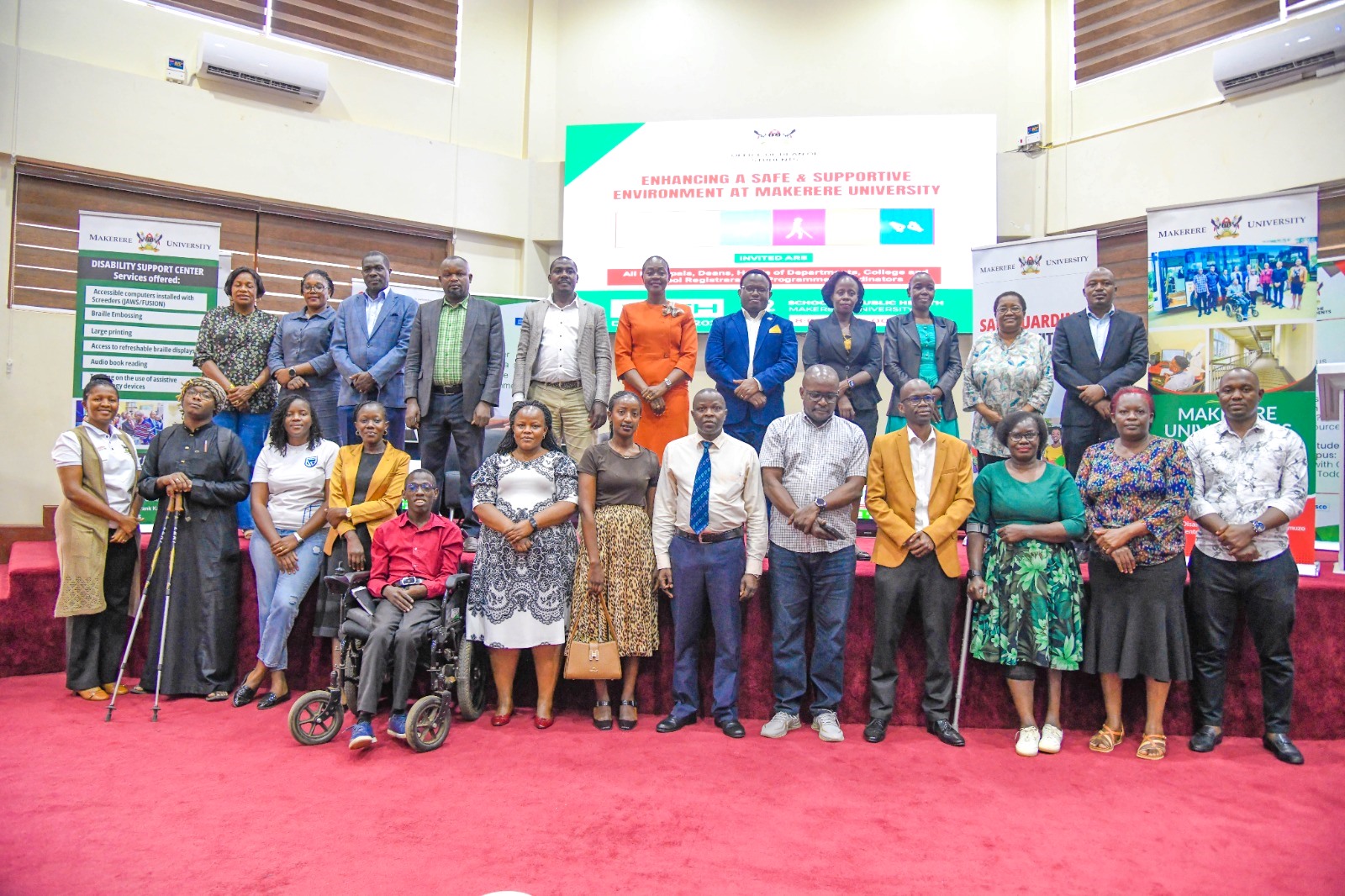
The University is a place of learning but also has policies on safeguarding and policy on Persons with Disabilities to ensure that safety, dignity and inclusion form the foundation upon which teaching, learning and research occur.
Prof Ireeta extended appreciation to the Dean of Students and the Mastercard Foundation Scholars Program at Makerere University for the consistent leadership provided in driving safeguarding and inclusion agenda.
Speaking at the event, Prof. Justine Namaalwa Jjumba, Director of the Mastercard Foundation Scholars Program, highlighted the transformative partnership between Makerere University and the Mastercard Foundation, which began in 2013.
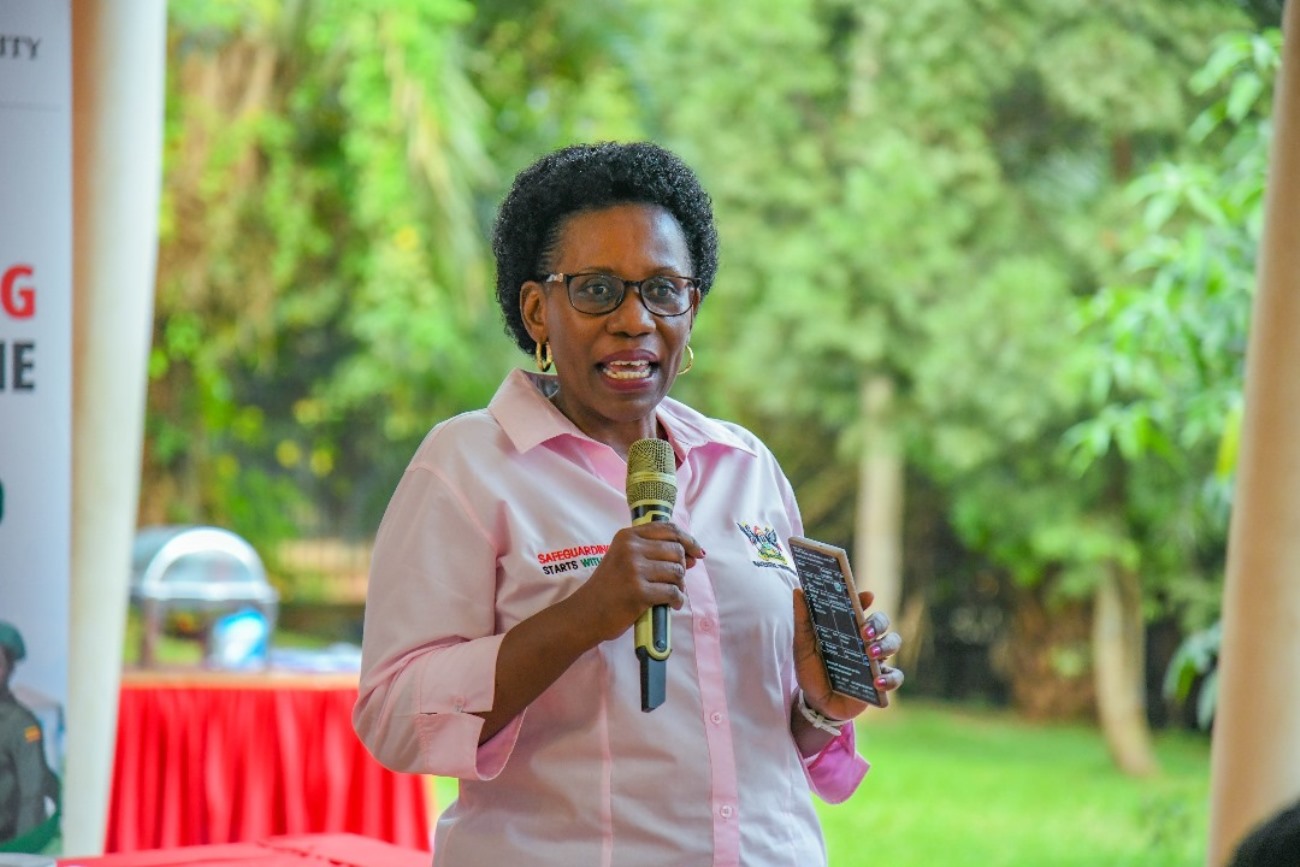
“Through this collaboration, the University has rolled out three key Educational initiatives: the Mastercard Foundation Scholars Program, offering 1,000 undergraduate scholarships (10% reserved for students with disabilities); the Africa Climate Collaborative, providing 250 MSc, 40 PhD, and 30 postdoctoral scholarships, with 10% dedicated to learners with disabilities; and e-Learning Initiatives, which allow students to pursue courses of their choice online, enhancing access and flexibility in education,” Prof Namaalwa, said.
During the session, different staff members highlighted that although the University, has made efforts to improve physical accessibility and strengthen the academic and non-academic environment, challenges including inadequate support and inaccessible facilities still exist.
Representing staff living with disabilities on the University Council, Mr. Amon Muteganda appealed to the Government to increase the number of students with disabilities admitted on government sponsorship and also stop choosing academic courses for them.

“I want to thank the Mastercard Foundation Scholars Program at Makerere University for ensuring that 10% of their scholarship slots are reserved for students with disabilities. As a University, we need to increase our enrolment of students with disabilities beyond the current 2%. We should also develop a policy that supports students across all academic programs. If a student without hands wants to study architecture, we must support them rather than discourage them, it is the mind that matters, not the physical,” he emphasized.
Mr. Mutenganda also called upon the University to revise its disability policy, with a particular focus on strengthening accommodation and support for persons with disabilities when they are employed.
Speaking at the event, Mr. Marvin Galiwango, a lecturer at the College of Computing and Information Sciences (CoCIS), emphasized that instead of continually relying on imported wheelchairs and technologies, engineers at the College of Engineering, Design, Art and Technology (CEDAT) should take the initiative to develop technologies and wheelchairs for persons with Disabilities.
“Most persons with disabilities rely on imported technology, which they often cannot afford, leaving them with no choice but to beg. We have engineers at CEDAT who can design and produce these technologies locally, making them accessible and affordable for our people,” he noted,”
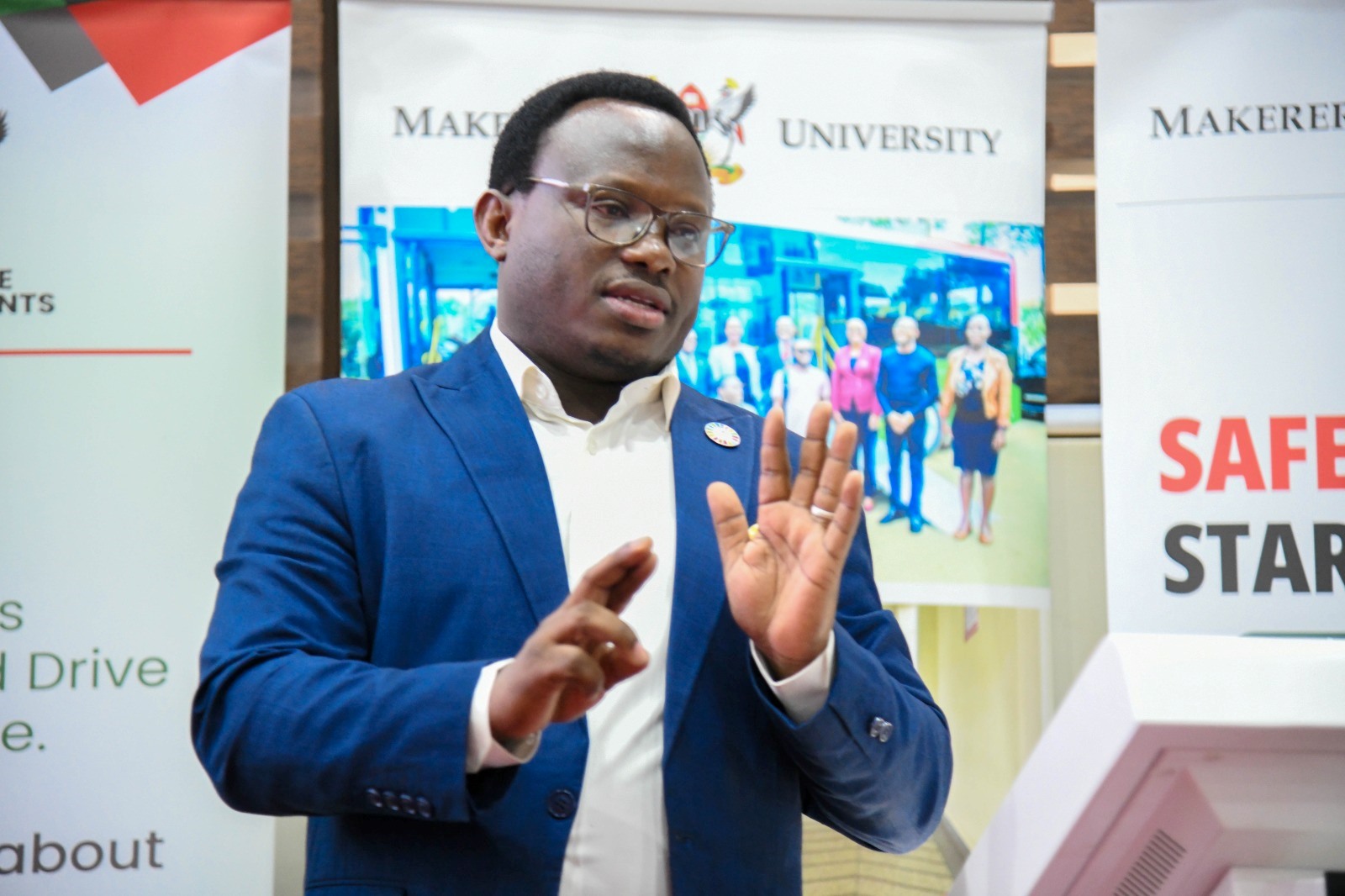
In his keynote address, Mr. Ambrose Murangira, a senior expert in disability inclusion at Light for the World, outlined the basic principles of accessible lecture rooms, including a preference for ground-floor rooms or those reachable via a functioning elevator, wide doors, corridors and clear passable pathways between tables and rows.
Students with disabilities should be provided with accessible seats at the front that offer clear sight-lines, tables with extra legroom, and adequate lighting around the presenter and board. Regarding facilities, signposts should indicate the nearest accessible washrooms and emergency exits, which must be both physically and visually accessible.” Mr Murangira, said.
On 1st December, the University joined the world to celebrate the International Day of Persons Disabilities. Students, staff and Members of Parliament with visual, hearing and physical disabilities filled the Main Hall with the aim to promote inclusion, raise awareness on disability rights, and encourage a supportive learning environment for everyone to thrive.
General
Makerere University commemorates International Day of Persons with Disabilities: Emphasizes Disability-Inclusive Programmes
Published
5 days agoon
December 10, 2025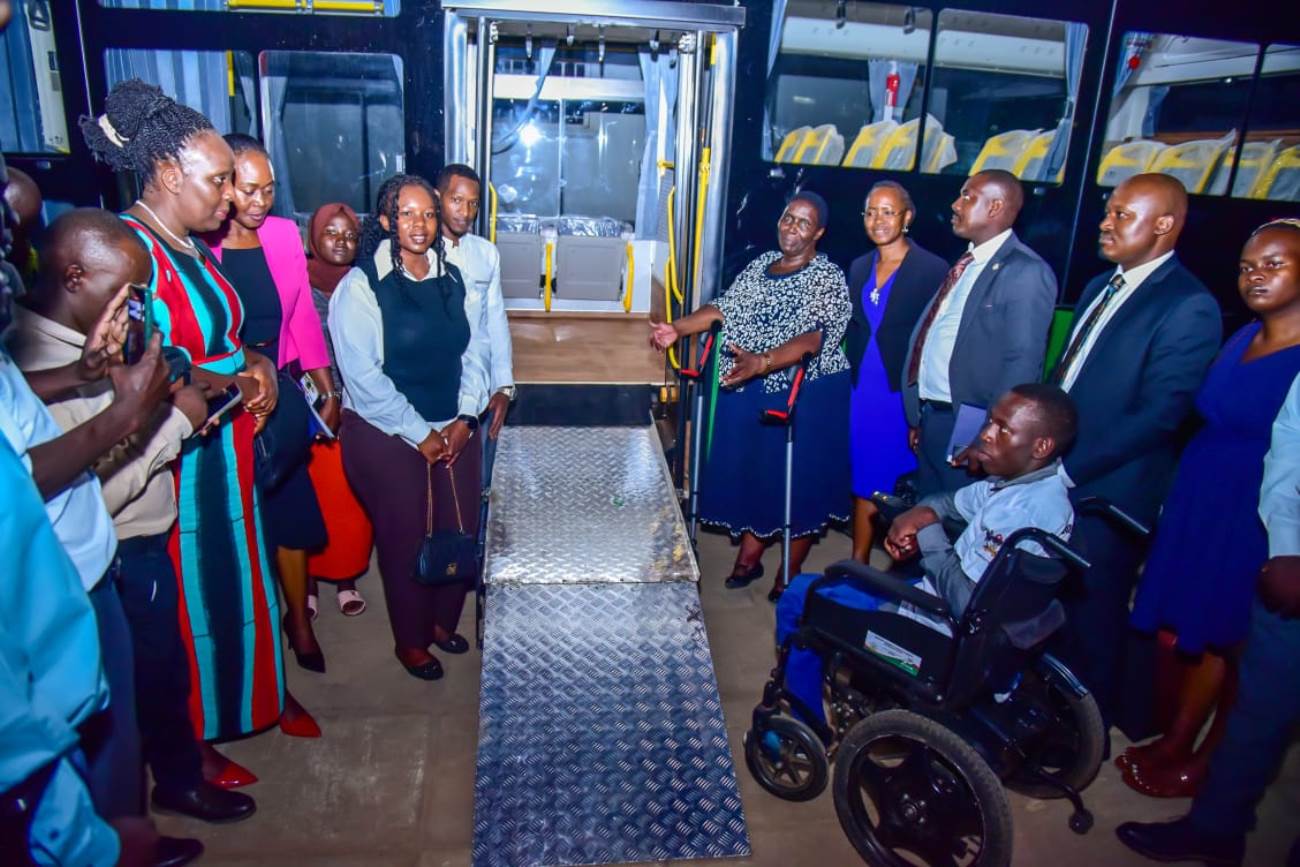
In the first week of December 2025, Makerere University in solidarity, with the rest of the world, celebrated the International Day of Persons with Disabilities.
The colourful event held in the University Main Hall on 1st December 2025 brought onboard Ministers and government officials, Makerere University Council and Management, National Union for Persons with Disabilities (NUDIPU), representatives of persons with disabilities at different levels, members of parliament, disability rights advocates, private sector partners, civil society actors, university staff, student leaders, and the wider community of persons with disabilities.
The celebrations graced by the Minister of State for Disability Affairs, Hon. Hellen Grace Asamo and the Deputy Vice Chancellor (Academic Affairs)-Prof. Sarah Ssali was attended by key stakeholders including Hon. Safia Nalule Juuko-Chairperson of the Equal Opportunities Commission, Prof. Frank Mwiine-Acting Deputy Vice Chancellor (Finance and Administration), the Dean of Students-Dr. Winfred Kabumbuli, Guild President-Hon. Ssentamu Churchill James, Guild Minister for Persons with Disabilities-Hon. Donita Akakunda, and among other personalities.
The commemoration featured a panel discussion moderated by Dr. Diana Ateenyi Ahumuza, offering a blend of academic, experiential, and advocacy-based perspectives on disability inclusion. The panel consisted of Dr. Naboth Rwakazwaire, founder of Hope for People with Disabilities; Prof. Anthony Muwagga Mugagga, Principal of the College of Education and External Studies (CEES); Lord Councillor Peace Sserunkuma; and Ms. Catherine Nakibuuka, a second-year law student. Their conversation explored practical solutions, policy gaps, personal experiences, and the role of institutions such as Makerere University in shaping a more inclusive society.
Reflecting on the times and in line with the theme, Fostering Disability-Inclusive Societies for Advancing Social Progress, the different speakers, persons with disabilities, and participants in general, lauded Makerere University for positive steps being undertaken with respect to inclusion of persons with disabilities. The participants commended the University for inclusive teaching, library services that are sensitive and inclusive, acquisition of a university bus for students with disabilities, sports activities for persons with disabilities, and establishment of the Makerere University Disability Support Unit. The institution has been called upon to remodel the old buildings so that people with disabilities are able to access the required spaces.
Highlighting strides in Disability Inclusion at Makerere
Welcoming the guests, Prof. Sarah Ssali, the Acting Vice Chancellor, celebrated Makerere University’s commitment to recognizing the resilience, contributions, and potential of persons with disabilities. She emphasized that building truly inclusive societies requires a dual approach: empowering marginalized individuals to realize their potential and creating institutions that are receptive and accommodating of diverse needs. Prof. Ssali underscored that disability inclusion is not an act of charity but a matter of human rights, social justice, and a collective responsibility shared by the entire university community.
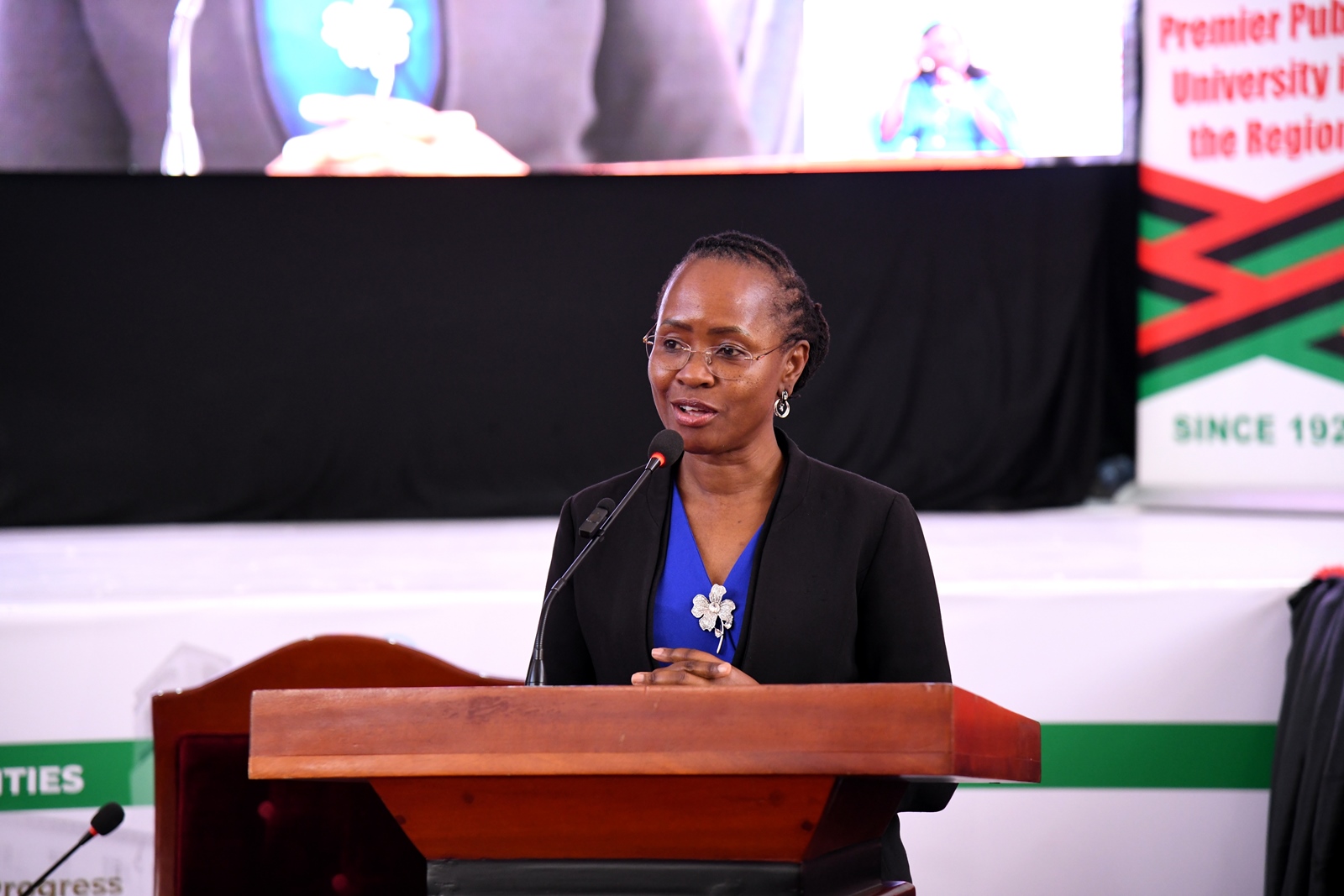
Prof. Ssali highlighted Makerere University’s strong commitment to inclusivity, noting the Disability Support Centre’s support, campus accessibility improvements, flexible teaching approaches, and digital inclusion efforts. She also recognized investments in sign language interpretation and staff training to better support students with disabilities.
Prof. Ssali called upon stakeholders to make inclusion a lived reality—one that celebrates diversity and recognizes disability as an integral part of the human experience. She explained that genuine inclusion is built on partnership, shared responsibility, and intentional accommodations, noting that these principles underpin the university’s safeguarding policy inspired by the Ubuntu philosophy. She observed that inclusion goes beyond creating comfort. “It requires those without disabilities to actively adjust, accommodate, and treat everyone as equal participants in the university community,” she said.
Dr. Winifred Namuwonge Kabumbuli, Dean of Students at Makerere University, reaffirmed the university’s long-standing commitment to implementing inclusive policies and practices. She emphasized that Makerere values diversity and creativity, fosters mutual support, and provides an inclusive academic and social environment that enables all members to grow, thrive, and contribute as changemakers.
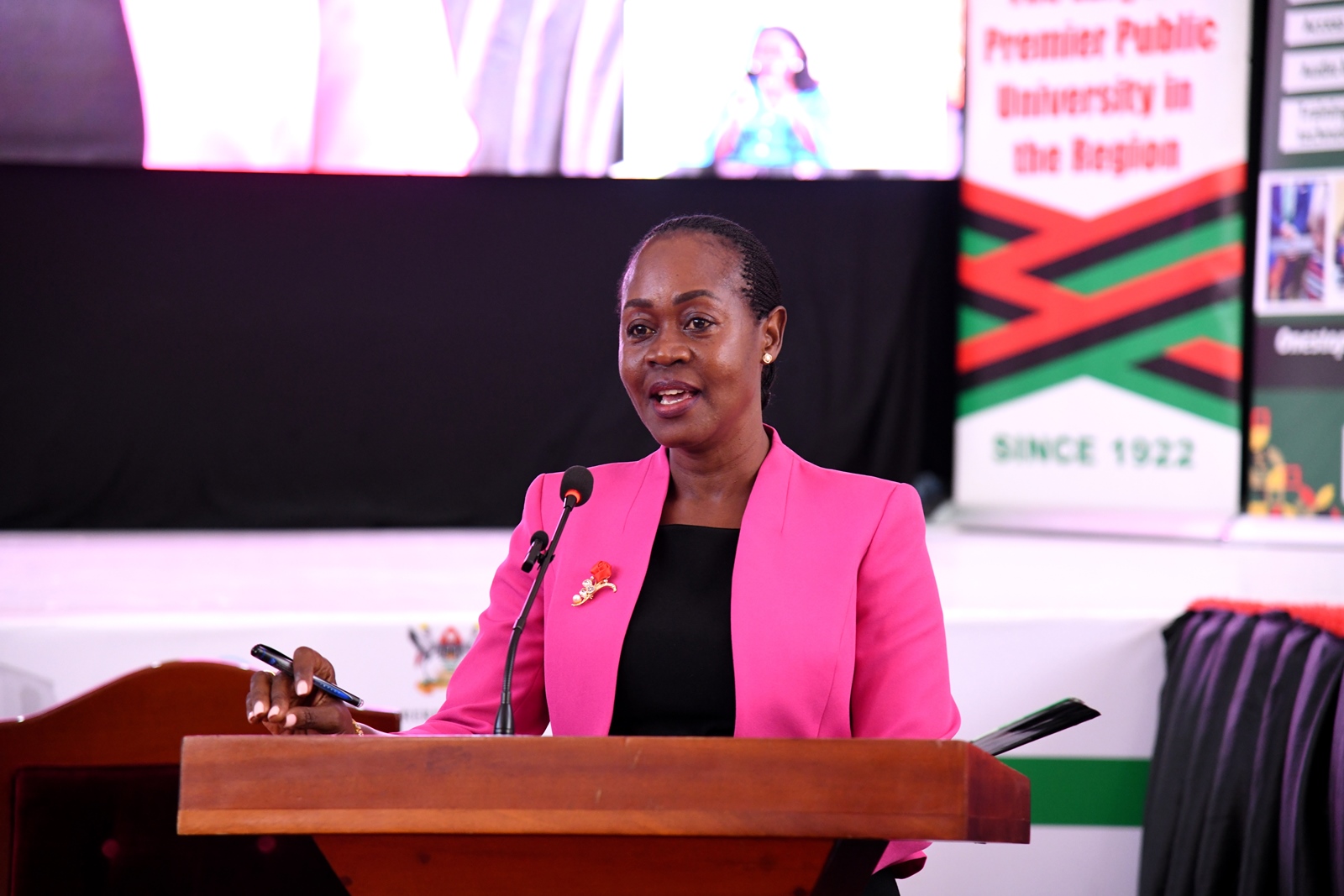
The Dean of Students highlighted Makerere University’s provision of essential assistive devices such as wheelchairs, Braille materials, and white canes to support full integration of students into academic and social life. She noted the university’s commitment to equitable academic participation through measures such as extra exam time, access to readers, and provision of carers who receive accommodation, feeding, and remuneration.
“Let us unite in promoting disability awareness, understanding, and inclusion. Together, we can build a more inclusive and supportive community. One of Makerere University’s core aims is to ensure that everyone at this esteemed institution has the opportunity to participate in every aspect of life to the best of their abilities and dreams as we build for the future,” she said.
Minister appeals for true inclusion through shared spaces and equal access
The Guest of Honour, Hon. Hellen Grace Asamo, Minister of State for Disability Affairs, stated that disability is shaped more by societal attitudes than by personal limitations. She called for true inclusion through shared spaces, equal access, and collective participation. She urged parents to take equal responsibility for their children with disabilities and reminded the public that anyone can experience disability, making proactive inclusion a collective responsibility.
“Disability is an idea shaped by society, and the attitudes often start at home. When a child is born with a disability, many see it as a burden. And while women often bear the brunt, fathers must also support their children. Remember: anyone can become disabled at any point—through accident, illness, or age. So planning for inclusion is not optional; it is necessary,” Hon. Asamo said.
She added that breaking barriers is essential, as persons with disabilities continue to excel across various fields. According to her, inclusive progress depends on creating opportunities rather than imposing limitations, and on recognizing that persons with disabilities are not homogeneous, but a diverse group with unique abilities, needs, and potential.
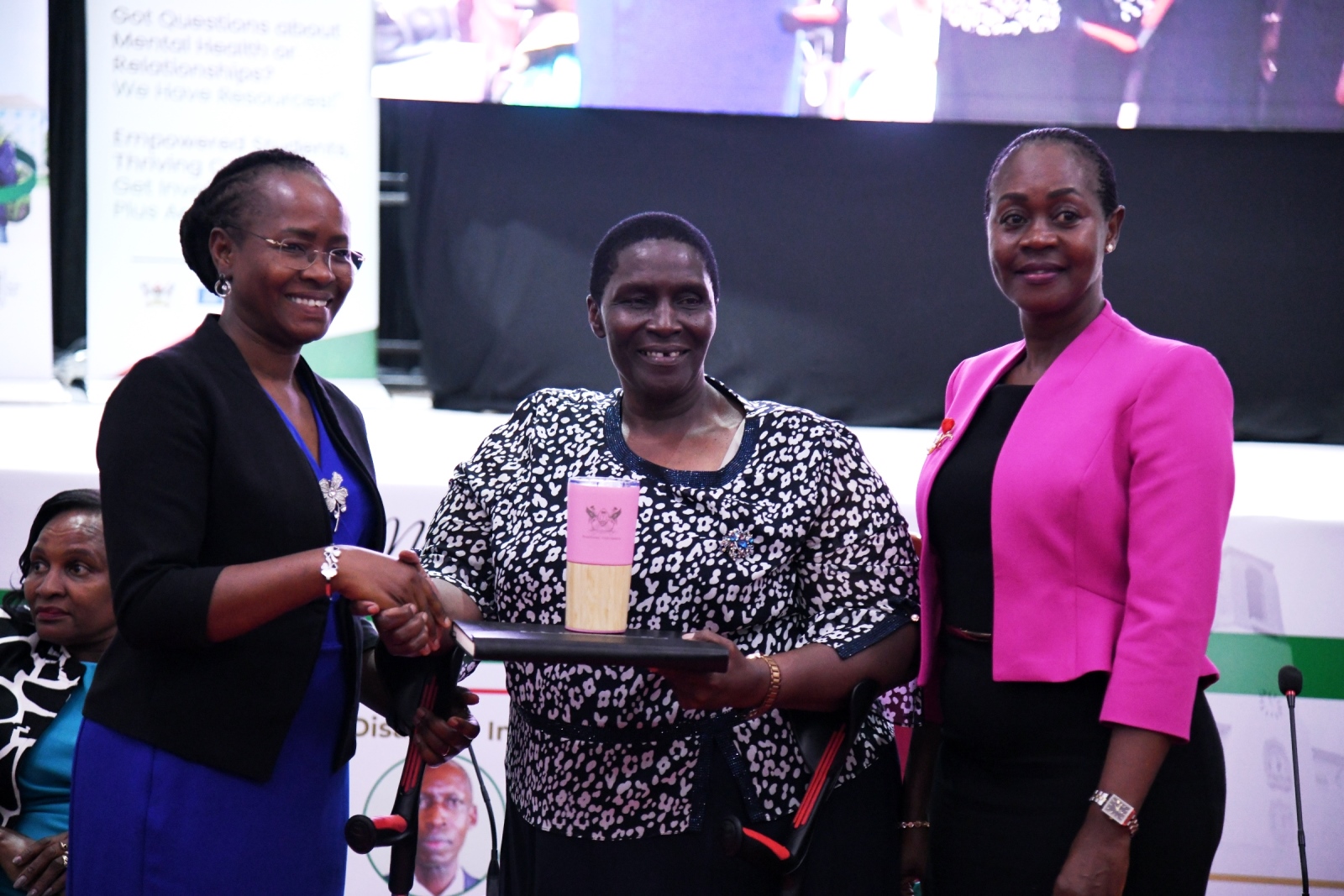
Hon. Asamo urged academic leaders to leverage their influence beyond the Makerere University main campus, to promote inclusive communities, calling for accessible education pathways, employability-focused training, and stronger advocacy against stigma. She emphasized that leadership is defined by capability, not physical condition, and noted the importance of mentorship, counselling, and job preparation for graduates with disabilities.
The Minister highlighted the everyday challenges faced by persons with disabilities, stressing that both public and private sectors must take action. She praised emerging inclusion in beauty, fashion, and entertainment, noting pageants and showcases as affirmations that talent and dignity transcend disability. She encouraged persons with disabilities to always claim their space and be visible.
“To people living with disabilities: nobody will hand over to you, your space—you must claim it. Be visible and be heard. Inclusion is a right, not a debate. Persons with disabilities contribute to society and the economy just like anyone else,” she said.
Keynote Speaker advocates for an enabling environment for disability-inclusion
Delivering the keynote address, Hon. Safia Nalule Juuko, Chairperson of the Equal Opportunities Commission and former National Woman MP representing Persons with Disabilities in the 10th Parliament, affirmed that disability is not a single condition, but a diverse experience shaped by the interaction between health conditions and environmental barriers.
Hon. Safia Nalule was emphatic that families, teachers, and communities must create enabling environments, and praised the role of supportive parents and educators in her own life while calling attention to the many children who lack similar support.
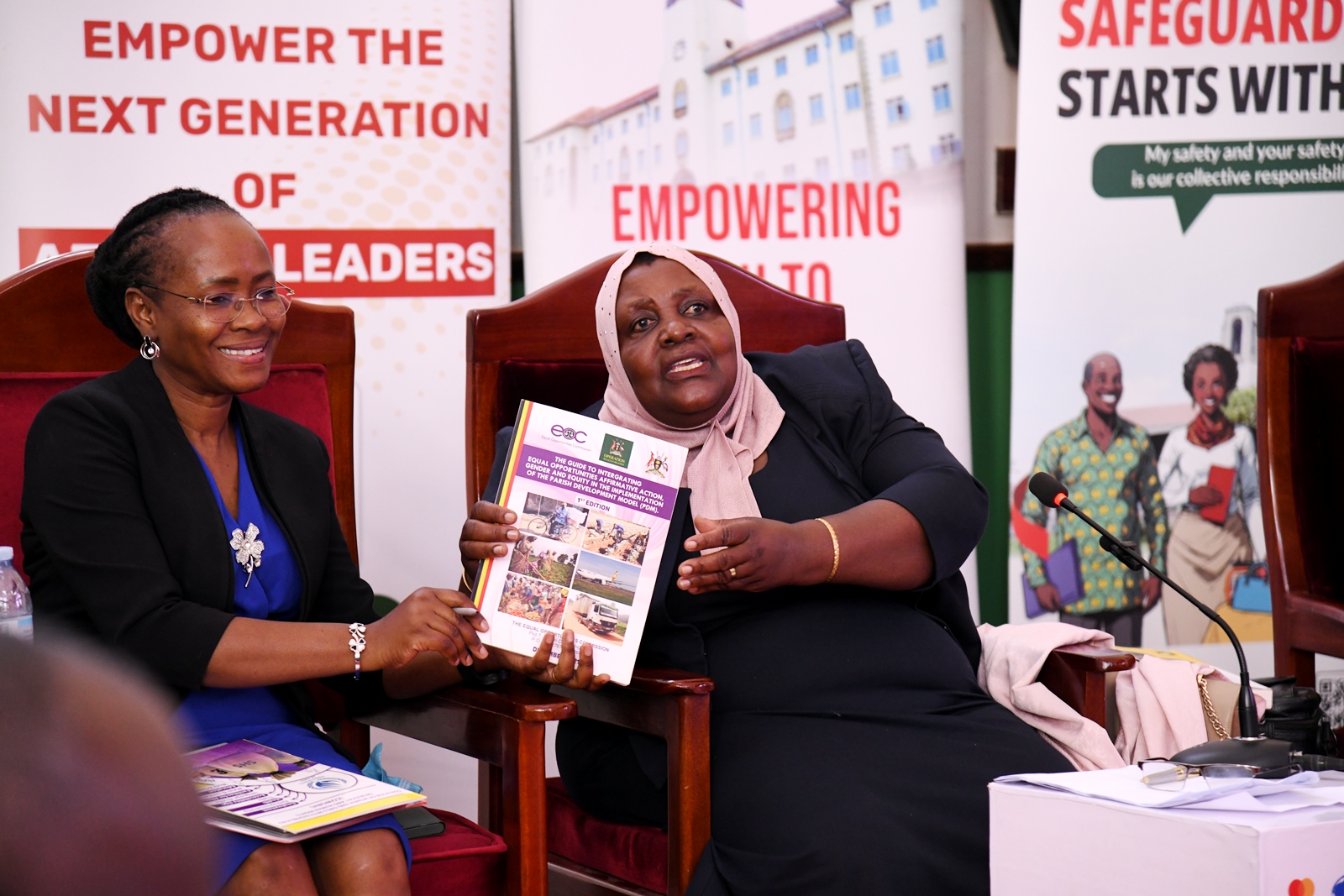
“Families must accept their children, support them, understand their needs, and avoid treating disability as a curse or omen. Children with disabilities are entitled to healthcare, nutrition, education, and decision-making space. Sadly, many do not receive these rights,” Hon. Safia Nalule said.
She recommended that disability inclusion requires practical, measurable action: education and awareness led by persons with disabilities, meaningful consultation, and active participation in planning, budgeting, and implementation. She stressed that institutions must budget for both physical and financial access since the cost of exclusion far outweighs that of inclusion.
Inclusivity must span humanities and science disciplines
Prof. Frank Mwiine, Acting Deputy Vice-Chancellor (Finance & Administration) and Principal of the College of Veterinary Medicine, Animal Resources & Bio-Security, asserted that in addition to the humanities and social sciences, inclusivity must span all disciplines, including STEM (Science, Technology, Engineering, and Mathematics). He articulated that inclusion is a continuous responsibility, not a one-off event or favour. “It is a responsibility that Makerere University must consistently and intentionally uphold, and we are committed to doing exactly that,” he affirmed.
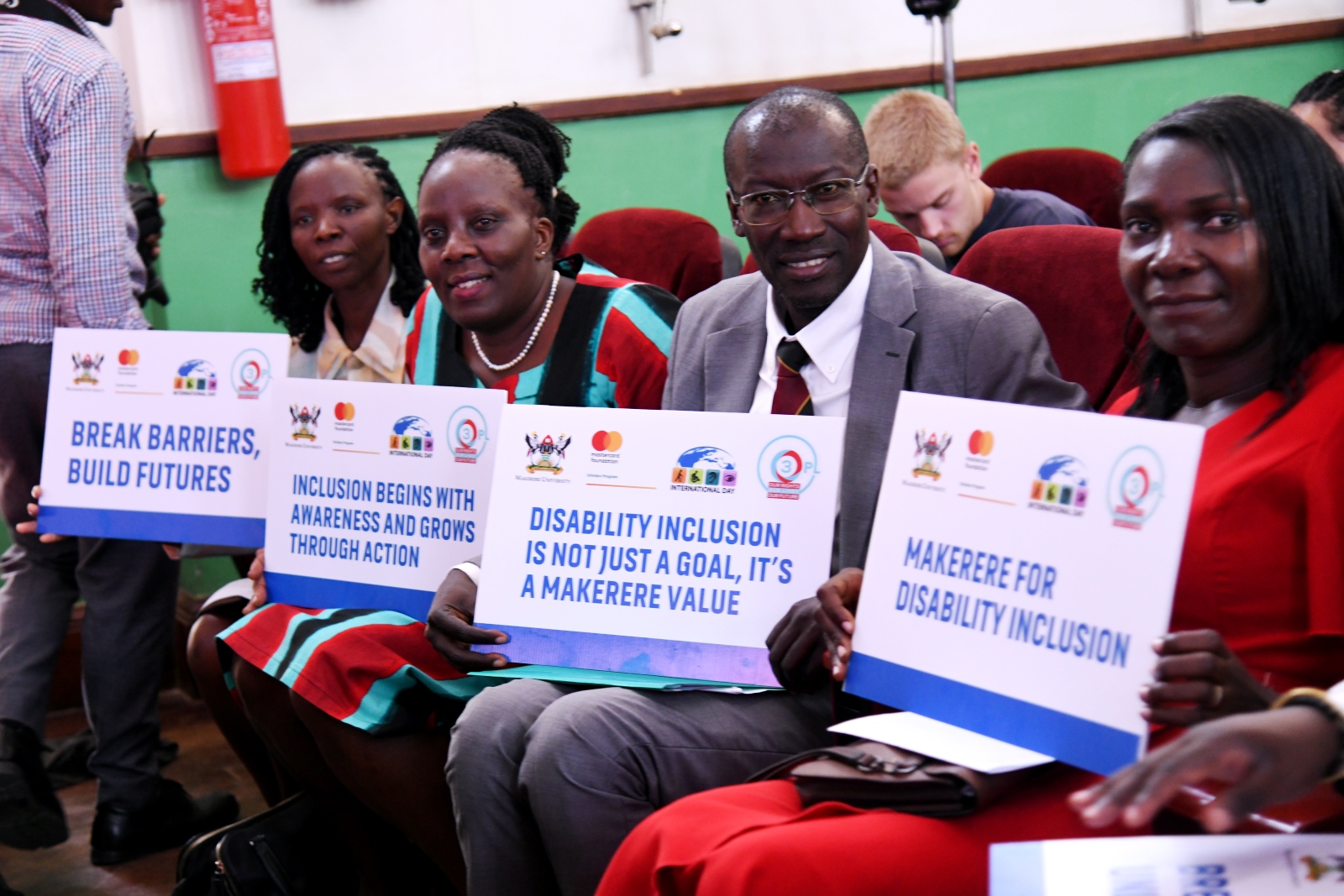
Mak Council lauded for promoting disability-inclusion
Mr. Amon Muteganda, representative of administrative staff with disabilities on the Makerere University Council, reaffirmed that the university is indeed an inclusive institution. He noted that disability-related concerns consistently receive respect and thoughtful consideration during council deliberations, with members listening attentively and responding constructively. He praised management for its timely action on the issues raised, highlighting the new transport initiative as a key example.
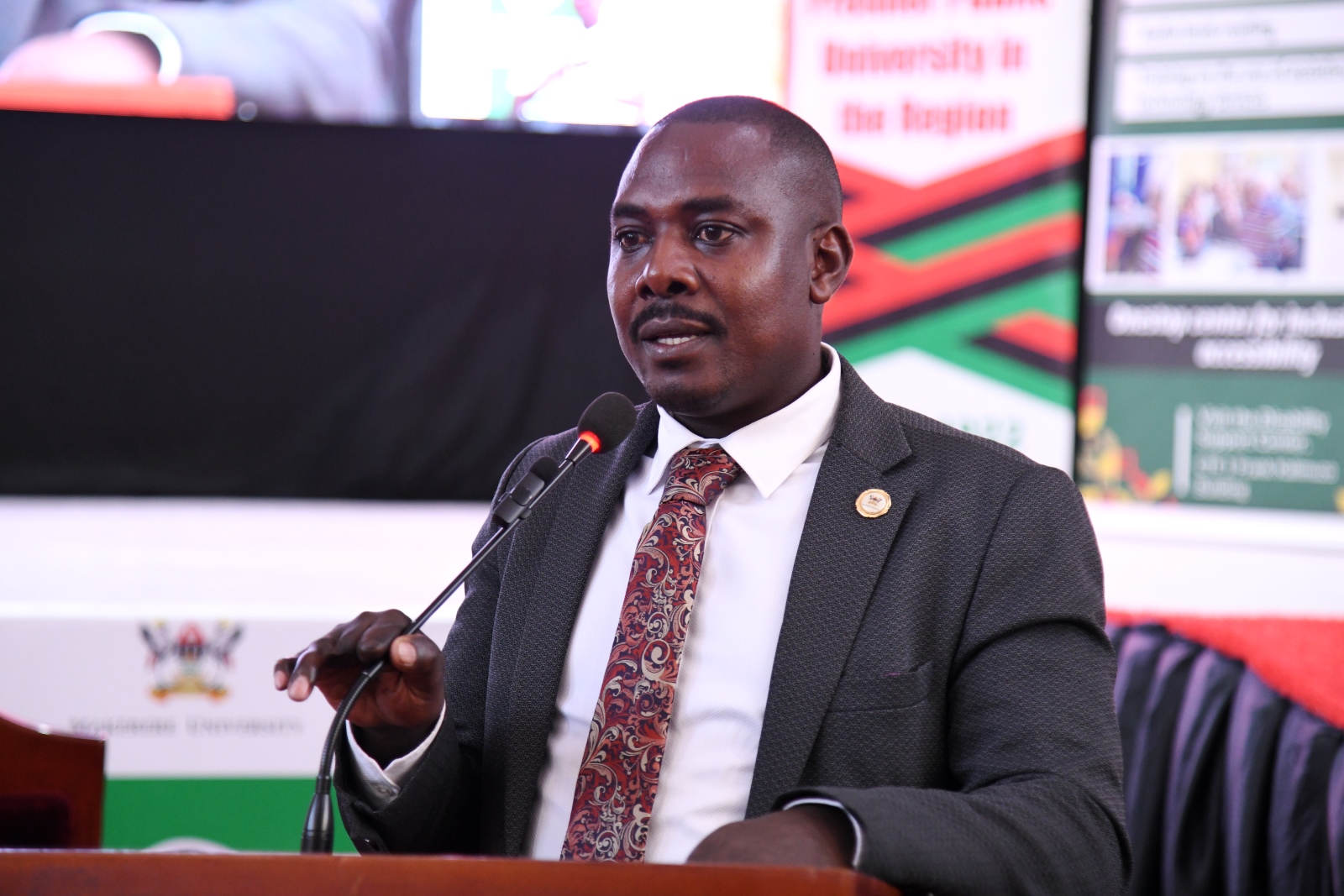
“Many people have spoken about inclusivity at the management level, and we have seen it in action. I want to sincerely thank the university management for their responsiveness. Whenever we raise concerns about disability-related issues, they are addressed promptly. One notable example is our transport initiative,” Mr. Muteganda said.
Student leader asserts disability is not inability
The Guild Minister for Persons with Disabilities, Hon. Donita Akankunda reflected on her experiences as a student with low vision and representative of visually impaired learners. She acknowledged improvements in accessible infrastructure, such as buildings and transport. She applauded the determination of fellow students with disabilities to create awareness, challenge stereotypes, and demonstrate that disability is not inability.
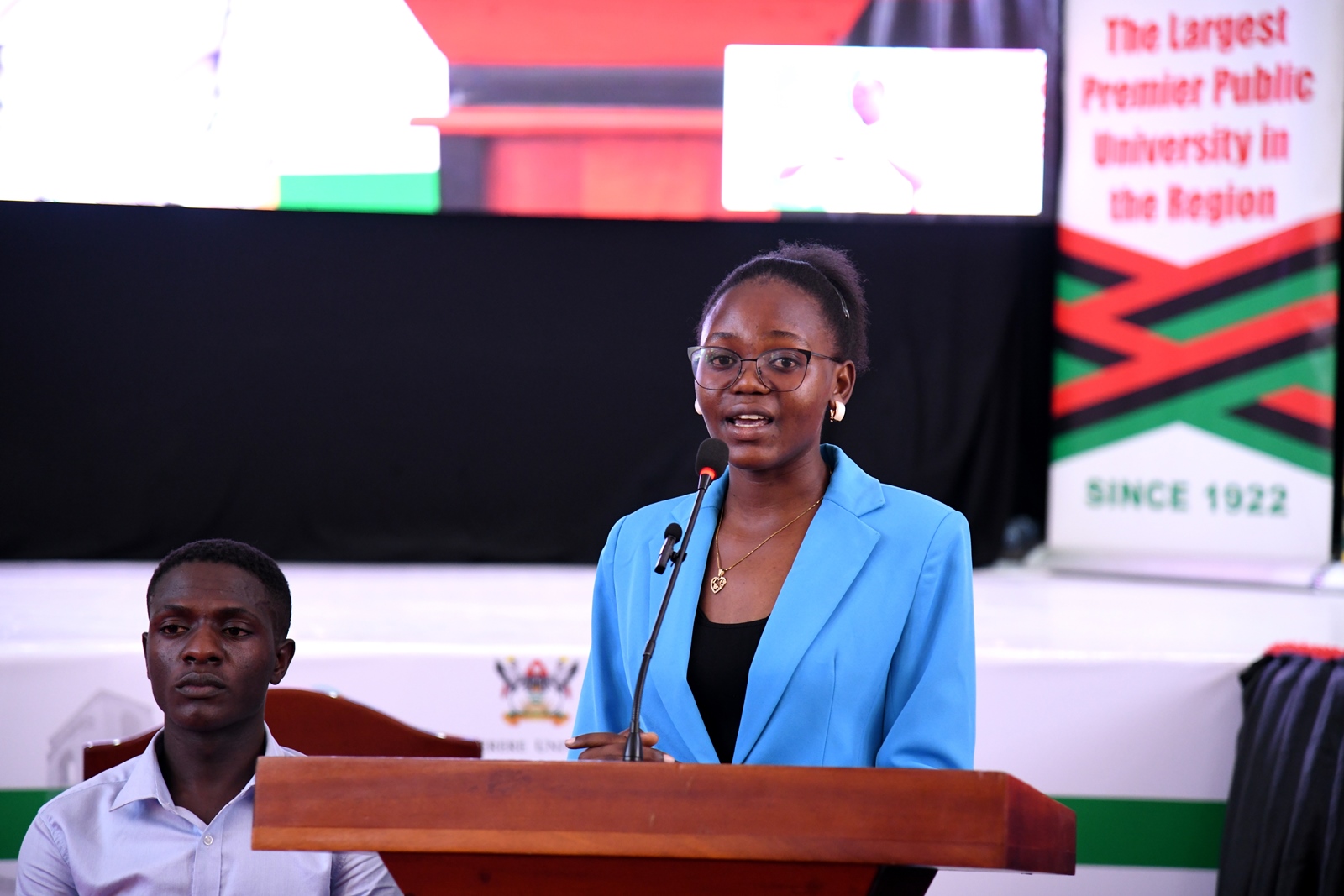
“My fellow students and persons with disabilities, I thank you for your resilience and dedication to raising awareness. Despite the many challenges we face, you have stepped forward, embraced leadership roles, and engaged in meaningful activities, demonstrating that disability is not inability. Together, we will continue to prove this every day,” she said.
Student with Disability shares his experience on adaptation
Sharing his personal journey as a student with a disability, Mr. Safiri Mungofeni, a first-year Bachelor of Architecture student at Makerere University, reflected on his initial concerns about managing practical work, navigating equipment, and moving around campus. “Over time, with the support of accessible resources and encouragement from staff, I gradually adapted,” he said. He added that witnessing fellow students with disabilities confidently navigating campus life inspired him to believe in his own potential and persevere.

Drawing inspiration from global examples, such as Chris Downey, a visually impaired architect, Safiri declared that with proper support, encouragement, and mindset, students with disabilities can excel in fields where society least expects them.
Parents called upon to love and support children living with disabilities
Illuminating both the challenges and transformative possibilities of parenting children with disabilities in Uganda, Mr. and Mrs. Kizito Bbosa, parents of Hon. Catherine Nakibuuka, a second-year law student and Speaker of the Makerere University Students with Disabilities Association shared their journey that began when their daughter was born with visual impairment. In their quest for solutions, they initially invested all their resources in medical interventions, holding onto hope that she might one day regain her sight. When these options were exhausted, they redirected their focus entirely to education, embracing it as the next frontier of opportunity and empowerment for their daughter.
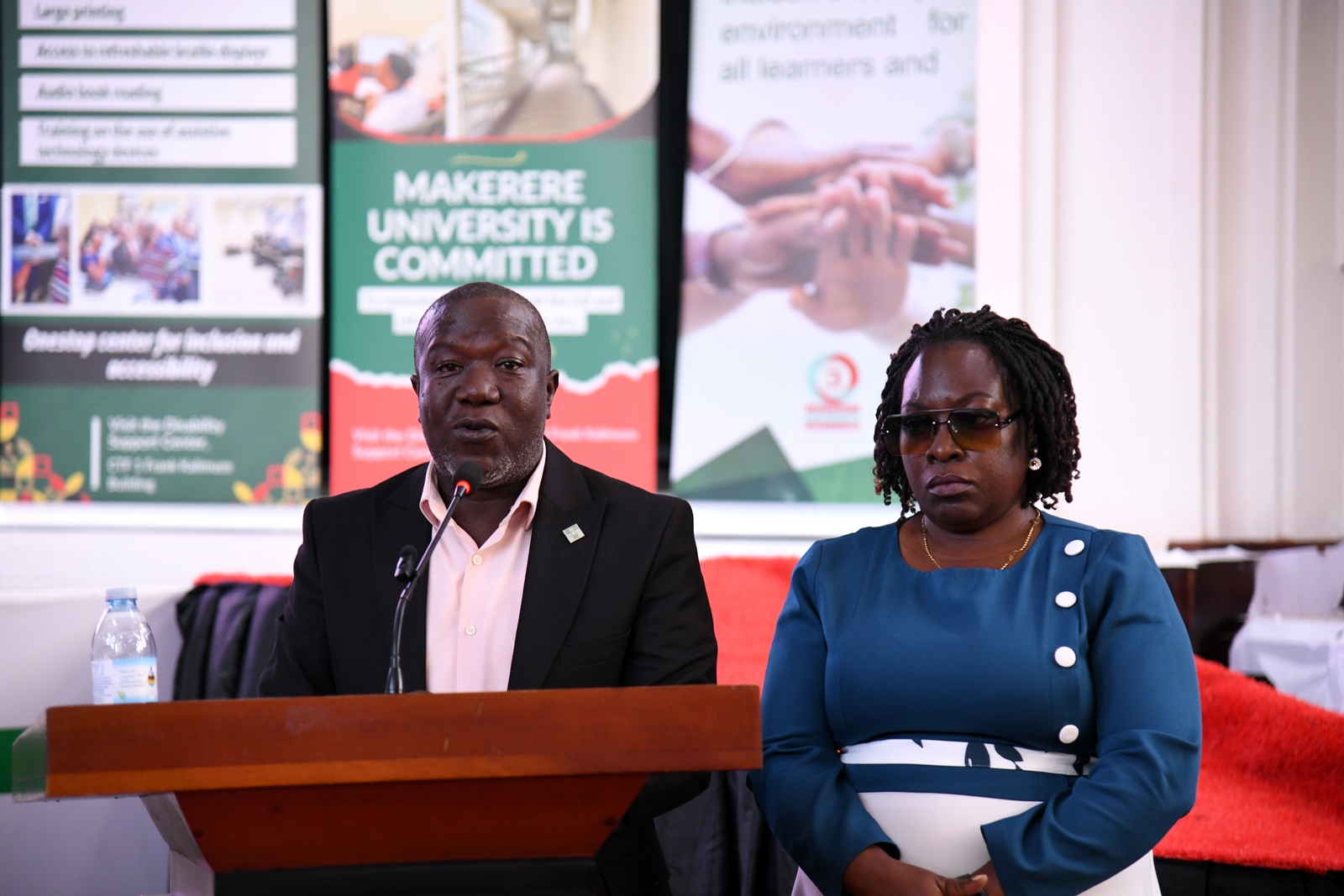
“When our daughter was born in 2003 with a visual impairment, I invested every resource I had, believing she might regain her sight, until I realized that even money has its limits. We then shifted our focus to her education. Truly, the most challenging experience I have ever faced has been trying to educate her,” Mr. Bbosa recounted.
Recognizing that Catherine and other visually impaired children deserved more than sympathy, the Bbosas transformed their personal struggle into a broader mission for change. This led to the founding of the Centre for Visually Impaired Children (CEVIC) and later CEVIC School for the Blind, institutions created not out of charity but from a belief in the potential of children with visual impairments, providing them with opportunities to learn, belong, and thrive.
Trending
-

 General1 week ago
General1 week agoCall For Expression of Interest: WEE-DiFine Research Initiative
-
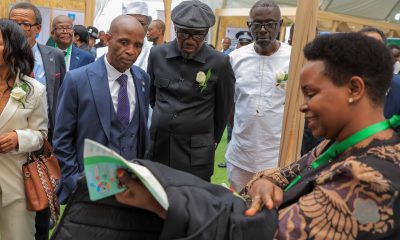
 Agriculture & Environment2 weeks ago
Agriculture & Environment2 weeks agoHow transformative education is shaping Africa’s next generation of innovators
-
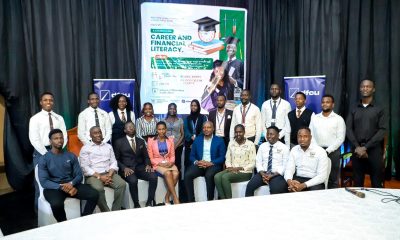
 General1 week ago
General1 week agoFrom Campus to Career: Makerere Advancement Office, 91st Guild and the DFCU Foundation Equip Students with Financial and Employability Skills
-
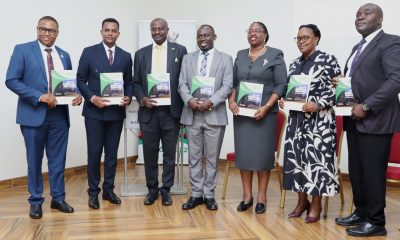
 Business & Management2 weeks ago
Business & Management2 weeks agoEfD-Mak, GRO Foundation & BoU Hold High-Level Roundtable on Green and SDG-Linked Financing
-
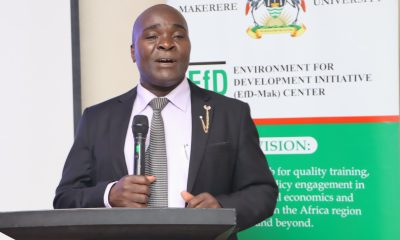
 Business & Management1 week ago
Business & Management1 week agoEfD, MDAs & Private Sector Strategize on Scaling up the Adoption of Climate Smart Agriculture in Uganda
